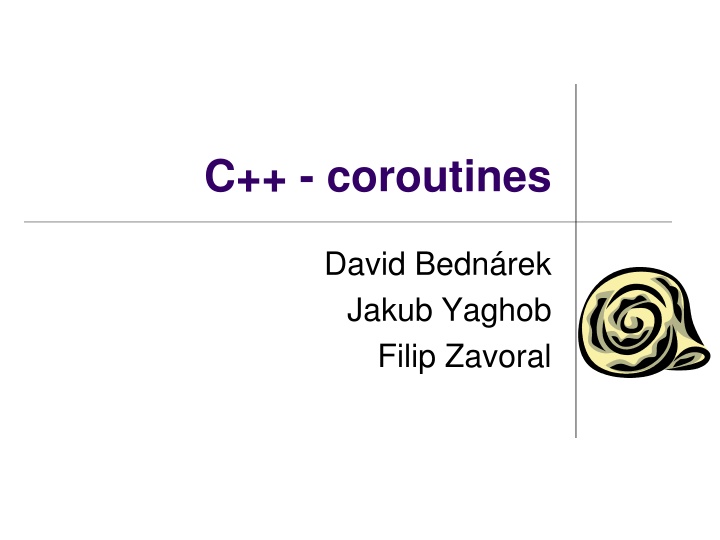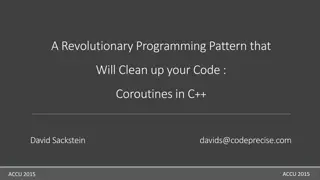
C++ Coroutines
Explore the world of C++ coroutines, from their definition to why they are used, types of coroutines (stackful and stackless), and the differences between them. Learn about C++20 coroutines and how to detect them.
Download Presentation

Please find below an Image/Link to download the presentation.
The content on the website is provided AS IS for your information and personal use only. It may not be sold, licensed, or shared on other websites without obtaining consent from the author. If you encounter any issues during the download, it is possible that the publisher has removed the file from their server.
You are allowed to download the files provided on this website for personal or commercial use, subject to the condition that they are used lawfully. All files are the property of their respective owners.
The content on the website is provided AS IS for your information and personal use only. It may not be sold, licensed, or shared on other websites without obtaining consent from the author.
E N D
Presentation Transcript
C++ - coroutines David Bedn rek Jakub Yaghob Filip Zavoral
References https://www.youtube.com/watch?v=RhXaKOe 3JZM https://blog.panicsoftware.com/coroutines- introduction/ https://www.scs.stanford.edu/~dm/blog/c++- coroutines.html
What are coroutines? Like a subroutines Can be called Can return when completed But with some differences Can suspend themselves Can be resumed (by someone else)
Why do we want coroutines? Event driven architectures Asynchronous I/O User interfaces Simulations Generators Lazy evaluation Cooperative multitasking Cheaper context-switch compared with threads
Stackful coroutines Stackful Fibers, green threads, etc. They have their own call stack Their lifetime is independent to the caller code Can be attached and detached to/from threads Cooperative scheduling Can be implemented as a library, no need for language support
Stackful coroutines Thread stack Fiber stack create AF AF call AF AF suspend AF AF resume return AF AF
Stackless coroutines Stackless Use caller s stack Can be suspended only from the top level function All function calls made by coroutine must return before suspend Coroutine state saved on the heap Require language level support Usually lighter C++ 20
Stackless coroutines Thread stack Heap create AF call suspend resume AF call AF return return call AF return AF
C++20 coroutines Stackless No higher level capabilities Generators, resumable functions, and other predefined patterns C#, JavaScript, Python, Higher level capabilities will be added in the next C++ release
C++20 coroutines How to detect a coroutine? Any use of coroutine keyword transforms a function to the coroutine Expressions co_await, co_yield Statement co_return
What does co_await? All local variables in the current function are saved to a heap allocated object Creates a callable object that, when invoked, will resume execution of the coroutine at the point immediately following evaluation of the co_await expression Calls (jumps to) a method of co_await s target object a, passing that method the callable object from 2nd step
Coroutine handles Coroutine handle Like a C pointer Type std::coroutine_handle<> Call coroutine_handle::destroy to avoid leaking memory, it destroys the state Once destroyed, invoking coroutine handle has undefined behavior Coroutine handle is valid for the entire execution of a coroutine , even as control flows in and out of the coroutine
What does co_await again? What does co_await a; The compiler creates a coroutine handle and passes it to the method a.await_suspend(coroutine_handle) The type of a must support certain methods Awaitable object or awaiter
co_await example struct Awaiter { std::coroutine_handle<> *hp_; constexpr bool await_ready() const noexcept { return false; } void await_suspend(std::coroutine_handle<> h) { *hp_ = h; } constexpr void await_resume() const noexcept {} }; void main() { std::coroutine_handle<> h; counter(&h); for() { h(); // unable to get i, just call } h.destroy(); } ReturnObject counter(std::coroutine_handle<> *continuation_out) { Awaiter a{continuation_out}; for (unsigned i = 0;; ++i) { co_await a; // use i here } }
What does co_await again (2nd attempt)? auto res = co_await expr; auto && a = expr; if(!a.await_ready()) { a.await_suspend(coroutine_handle); // suspension point } auto res = a.await_resume();
Predefined awaiters Include <coroutine> std::suspend_always await_ready returns false std::suspend_never await_ready returns true
Coroutine return object Coroutine return type R must be an object with nested type R::promise_type Missing member function causes undefined behavior struct ReturnObject { struct promise_type { ReturnObject get_return_object() { return {}; } std::suspend_never initial_suspend() { return {}; } std::suspend_never final_suspend() { return {}; } void unhandled_exception() {} }; };
What does co_yield? We need to get values from coroutines somehow co_yield e; is equivalent to co_await p.yield_value(e);, where p is a promise
co_yield example 1st part struct ReturnObject { struct promise_type { unsigned value_; ReturnObject get_return_object() { return { // Uses C++20 designated initializer syntax .h_ = std::coroutine_handle<promise_type>::from_promise(*this) }; } std::suspend_never initial_suspend() { return {}; } std::suspend_never final_suspend() { return {}; } void unhandled_exception() {} std::suspend_always yield_value(unsigned value) { value_ = value; return {}; } }; std::coroutine_handle<promise_type> h_; };
co_yield example 2nd part ReturnObject counter() { for (unsigned i = 0;; ++i) co_yield i; // co yield i => co_await promise.yield_value(i) } void main() { auto h = counter().h_; auto &promise = h.promise(); for (int i = 0; i < 3; ++i) { std::cout << "counter: " << promise.value_ << std::endl; h(); } h.destroy(); }
What does co_return? How to signal that the coroutine is complete? Useful for finite streams Coroutine can call co_return e; for returning a final value e Compiler inserts p.return_value(e); Coroutine can call co_return; without value to end the coroutine without a final value Compiler inserts p.return_void(); Coroutine execution falls off the end of the function Equivalent to the previous case Check if coroutine is completed You can call h.done()
co_return example 1st part struct ReturnObject { struct promise_type { unsigned value_; ~promise_type() { /* do something */ } ReturnObject get_return_object() { return { .h_ = std::coroutine_handle<promise_type>::from_promise(*this) }; } std::suspend_never initial_suspend() { return {}; } std::suspend_always final_suspend() { return {}; } void unhandled_exception() {} std::suspend_always yield_value(unsigned value) { value_ = value; return {}; } void return_void() {} }; std::coroutine_handle<promise_type> h_; };
co_return example 2nd part ReturnObject counter() { for (unsigned i = 0; i < 3; ++i) co_yield i; // falling off end of function or co_return; } void main() { auto h = counter().h_; auto &promise = h.promise(); while (!h.done()) { // Do NOT use while(h) (which checks h non-NULL) std::cout << "counter: " << promise.value_ << std::endl; h(); } h.destroy(); }
What about remaining member functions from promise? Compiler wraps coroutine function body { promise-type promise promise-constructor-arguments ; try { co_await promise.initial_suspend() ; function-body } catch ( ... ) { if (!initial-await-resume-called) throw ; promise.unhandled_exception() ; } final-suspend : co_await promise.final_suspend() ; }
Automatic clean up Trick with p.final_suspend() If final_suspend suspends the coroutine, the state remains valid and code outside of the routine is responsible for freeing the object by calling destroy() If final_suspend does not suspend the coroutine, then the coroutine state will be automatically destroyed

